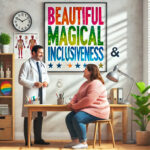My friend the diary (part 1)
My friend the diary (part 1)

by June Alexander
“…for years I have been searching, seeking my identity, my purpose, my meaning, in life. Years. I’ve concluded that I am a prisoner to myself…
I have had some hard lessons. I know I can live with myself only if I accept that my mistakes, my bad experiences, can be the catalyst, the seed, for new beginnings and fulfillment.
I find great difficulty in understanding myself, my behavior, but I must try to understand myself, my fears, my needs, if I am to correct myself and live out the rest of my life free from the nasty inhibitions that have plagued my inner self for so long.”
(Diary entry, age 38)
My first diary, a Christmas gift in the same year I developed anorexia nervosa at age 11, provided above all, comfort. The first entry, on January 1, 1963, is crammed with minute details such as the time and amounts of food consumed and exercise taken, and the time of awakening and going to bed. Until the diary arrived, all these secret thoughts had been crowding in my head with nowhere to go. Sharing them with my new friend the diary somehow helped me to feel less anxious. When I transitioned into anorexia-bulimia in adolescence, more self-expression is evident. Words tumbled out, as I tried to make sense of thoughts and feelings. My world was small. There was the diary, and me. Not for many years would I learn there was also the eating disorder, and that the diary’s influence extended far beyond the two of us.
The illness, like the diary, thrived on privacy—and encouraged the keeping of secrets. As a child and young woman, my diaries were safe places in which to express and analyze thoughts, and develop coping strategies. But, without guidance, confiding in the diary also strengthened the eating disorder, its unrelenting and stringent demands becoming increasingly impossible to meet. Nothing I did was enough and the rules of the illness became secrets within secrets that had to be guarded and hidden. For years, the diary was my only outlet. By age 28, my diary had recorded an almost complete disconnection of self from body.
Moving from secrets to truth
Trust was essential in transforming the diary from a secret-keeper that aligned with my illness, to a healing tool for my true self. I had several U-turn shifts in healing from severe and long term anorexia nervosa. First, at age 28, when I sought help for the first time, and second, in my early 30s, when I met the health professional who gained my trust. Development of trust is vital because one needs to trust the therapist more than the powerful eating disorder thoughts within. Outwardly, I presented as a wife and mother with a full-time career but within, the diary revealed a desperate struggle to honor daily lists and pledges, for instance, having a strict weight limit; running a set distance; and noting every calorie. At age 28, thoughts of suicide after 17 years with the disorder drove me to break the silence, and reveal the thoughts hitherto confined to my diaries, to a doctor. He and other doctors, upon learning I kept a diary, encouraged the continuance of such writing as a tool for expression. However, like me, those doctors were ignorant of the diary’s potential to play a pivotal role in my illness, and of its ability to be a foe as well as friend. Eventually, in my 30s, a psychiatrist gained my trust and suggested the diary could assist my healing process. He encouraged its use as a means to engage in written communication with him. Gradually, aided by patient, therapeutic guidance and discussion, what I wrote in my diary began to reconnect with and strengthen authentic thoughts and feelings. Self-abuse and self-harm gave way to self-care as my body and mind progressively reintegrated.
Decades later, at age 55, I healed sufficiently to re-enter life’s mainstream. As I “came out” and began to share my story publicly, the diaries “came out” too. For instance, besides providing the main resource for my memoir, A Girl Called Tim (2011), the diaries became a pool of documented “lived experience,” for other literary works. In another outcome, people with experience of eating disorders wrote to share their stories, which until now had been revealed only, if at all, in their diary. Many adult readers wrote at length, explaining that they had felt isolated and had kept their eating disorders a secret for decades, but upon reading, connecting and identifying with my story, were able to share and externalize their thoughts and experiences for the first time.
Reflecting on the responses from readers sparked recognition that perhaps my friend the diary had been destructive as well as constructive throughout my long illness, leading to my latest book, Using Writing as a Therapeutic Tool for Eating Disorders –The Diary Healer.
About food and shame
Today, I love food. For 40 years, however, every meal was an ordeal, sandwiched between layers of anxiety and guilt. Writing copious rules and contracts, on what to eat and how to behave, may provide brief relief, but eating disorder rules are doomed to fail. Therefore, during the eating disorder, while the diary can serve as a trusted confidant at a time of extreme isolation, a haven in which to attempt to make sense of a tortuous world, it also can become embroiled with—and become a servant of—the eating disorder; a secret within a secret.
Thus, without direction, the more I attempted to sort mental chaos in my diary, the more irrational I became in relation to real or perceived distressing events. However, gradually, with therapeutic guidance, the diary evolved from a survival tool to a method for building self. For instance, in The Diary Healer, diary writers discuss how writing has helped them to come to terms with and rise above their experiences of shame and stigma.
Drawing on my diaries in writing letters to trusted members of my treatment team helped me to edge forward in recovery, providing an avenue for connecting with people I trusted, even when I didn’t know which way was “forward.” From this tenuous leap of faith towards others who did not judge or criticize and were very, very patient, I began slowly to trust and connect with true “me.” With encouragement, I began to read through earlier diaries, to reflect on them and address the layers of issues within. This involved re-visiting painful and traumatic times, to release and re-story memories too difficult to process otherwise. Digging through and addressing layers of suppressed emotion was a prerequisite for escaping the eating disorder’s grip and constructing a safe base of self-belief. I made notes of specific thoughts and feelings, between appointments, to discuss at my next visit.
The path was not always rosy. There were great personal relationship losses and, upon healing, not all could be retrieved. Going forward required a total re-make; a reintegration of various frayed or lost strands of the true “me.”
To conclude, the essence of diary writing is about being a friend with your self. In this way, the diary is like a trusted, best friend, who knows all about you and loves you anyway. In people who develop an eating disorder, avoidance may kick in and lead to layers of deceit, not only with friends and family, but also with your diary. With guidance, however, the diary can become a reflective, exploratory and healing tool, and help you to discover or re-discover parts of true self. Therefore, besides providing a safe place to store and “let go” of emotion, the diary can serve as a personal trainer.

About June
I am a writer and international award-winning advocate in the field of eating disorders. I developed anorexia nervosa at age eleven in 1962, an illness that has largely shaped my life.
Since my recovery in 2006, I have written nine books on eating disorders. My latest title, Using Writing as a Therapy for Eating Disorders—The Diary Healer, is the main work in my Ph.D. in Creative Writing.
My passion for the narrative and patient-centred care has led to involvement in eating disorder advocacy at local, national and international levels. I work as a life writing and wellness skills mentor for patients, caregivers and health professionals. For more details, explore my website: https://lifestoriesdiary.com.
Recently, I have also engaged in an international exchange with Sandra Zodiaco and the Italian Association “Mi Nutro Di Vita” (Genoa), fighting against Eating Disorders and the stigma surrounding these illnesses. As part of this cooperation overseas, the Italian translation of this article is available at: www.minutrodivitalilla.blogspot.it.
— to be continued —





